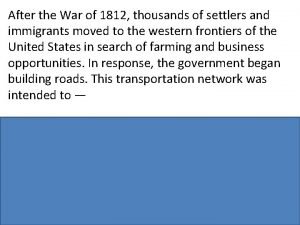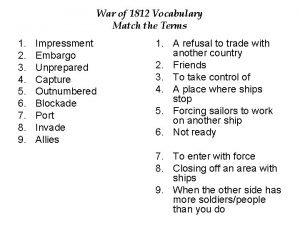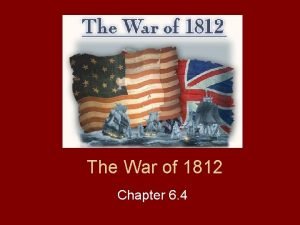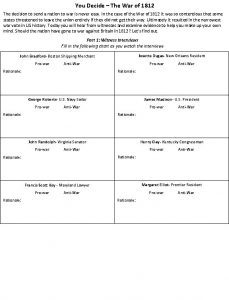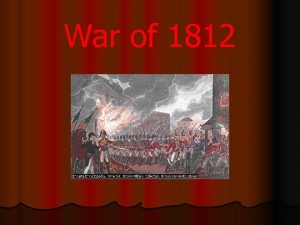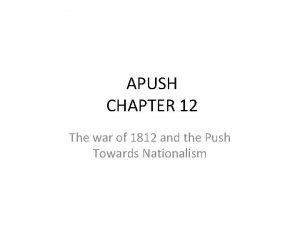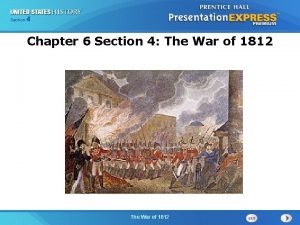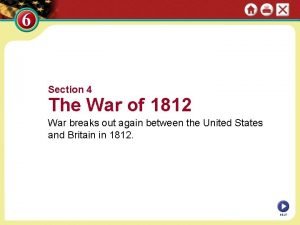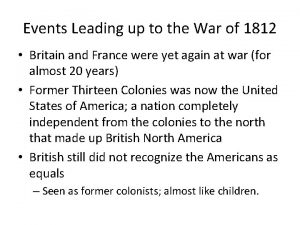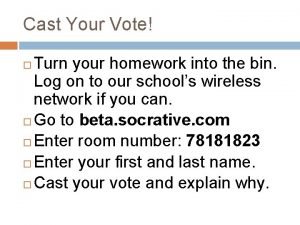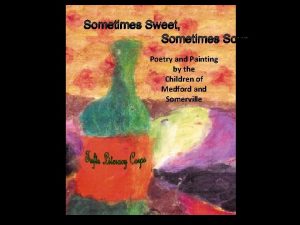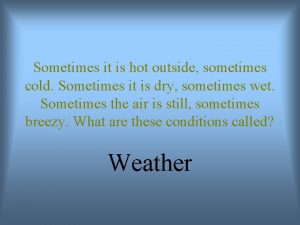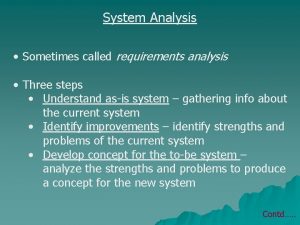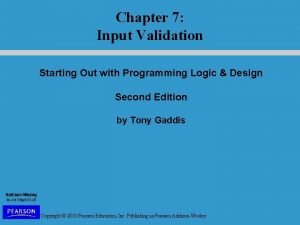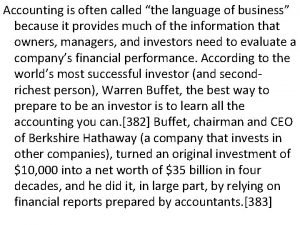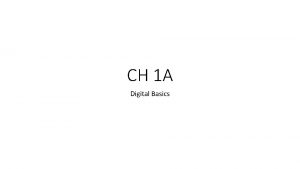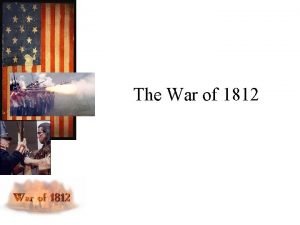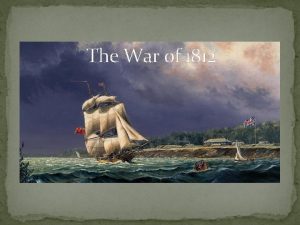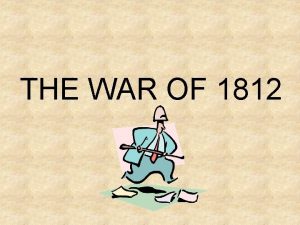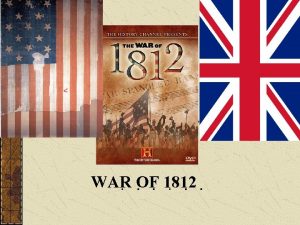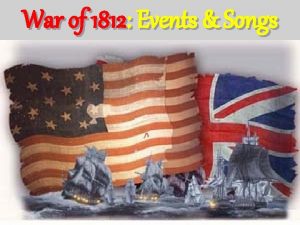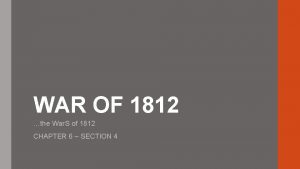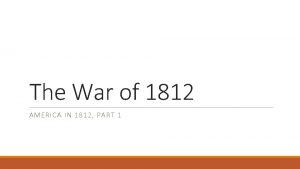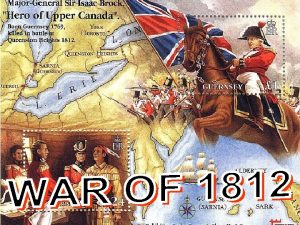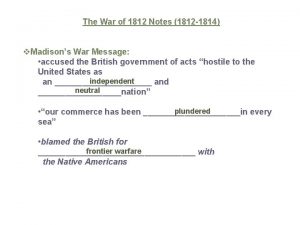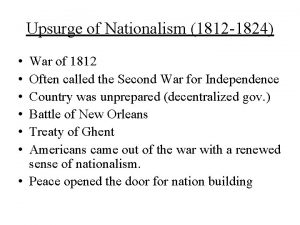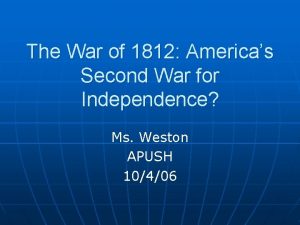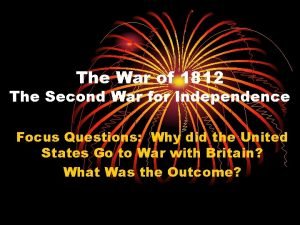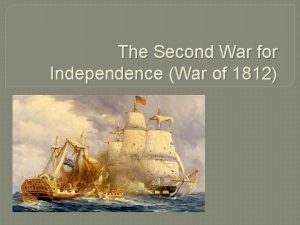War of 1812 Sometimes called the Second American



















- Slides: 19

War of 1812 Sometimes called the Second American Revolution

Causes of the War: Economics Jefferson’s Embargo Act of 1807 + Madison’s Non-Intercourse Act of 1809 = Lost revenues and high unemployment + an economic recession that led to a deep depression

Causes of the War: Neutral Rights • British and French naval ships stopped and boarded our vessels • Both countries confiscated our cargos • British navy continued to impress our sailors • Interfered with our “Freedom of the Seas”

Causes of the War: Indian Troubles • Americans were certain the British were supplying guns to the Native Americans in the Northwest Territory

Causes of the War: Land Incentives • Americans wanted land for expansion (resources, trade, $, power, etc. ) • Canada (owned by the British) • Florida (owned by the Spanish)

American Preparedness and Willingness to Fight • Small army and small navy • No national bank to organize bonds, loans, payments, etc. • “Warhawks” from southern western states wanted with Britain…(led by Clay from Kentucky)… “War Fever” & war Henry they had

American Preparedness and Willingness to Fight • Federalists from New England did not want war and organized the Hartford Convention • wanted to nullify acts of Congress • considered seceding from the US… • merchants from New England continued to sell goods to Britain

Military Events of War of 1812 • Northern Theatre: Canada (1812 -1814) • Central Theatre: Washington DC (Summer, 1814) • Southern Theatre: New Orleans, LA (January 1815) • War at Sea: Atlantic Ocean (1812 -1814)

Northern Theatre: Canada (1812 -14) • US attacked Canada crossing the Great Lakes • Britain attacked US crossing the Great Lakes • Fought to a stalemate on Lake Erie • Canadian Parliament building was burned by by

Central Theatre: Washington DC (Summer, 1814) • British captured and burned Washington, DC • British tried and failed to capture Baltimore • Francis Scott Key wrote Star-Spangled Banner (the poem was set to an old English tavern song)

Southern Theatre: New Orleans, LA (Jan 1815) • US Army General A. Jackson, with help from Jean Laffite and his pirates, beat the British • Battle of New Orleans occurred after Treaty of Ghent was signed (Dec 1814)

War at Sea: Atlantic Ocean (1812 -14) • US Navy had 6 “frigates” – 36 to 44 guns (cannons) • USA authorized 500+ “privateers” • British Navy had: 200 “battle ships” (17 near USA) – 64 to 74 guns 250 “frigates” (30 near USA) - plus lots of smaller support ships

War at Sea: Atlantic Ocean (1812 -14) • US Navy defeated three British frigates in 1812 • US Navy used “guerilla” tactics (hit and run) • US captured over 1500 British ships (military + merchant vessels) • British blockaded most US ports during war • British cut US imports and exports by 80%

Results of the War of 1812 • Land – no change in geographic boundaries • Impressment – the British stopped taking our men for their navy • Foreign Respect – Americans defended themselves against Great Britain, a military super-power…again

Results of the War of 1812 • Isolationism – Americans did not want to get involved in European problems and Europeans should not get involved in ours • Nationalism – increased pride and patriotism in America

Results of the War of 1812 • Westward Expansion – Native Americans were nearly gone from east of the Mississippi River…meant more land for white settlers • Growth of Manufacturing – increased economic and business activity to provide materials for war…stimulated the economy

Results of the War of 1812 • Collapse of Federalist Party – Federalists were considered traitors…lost all political power • Andrew Jackson – new national hero – was elected president in 1828

Results of the War of 1812 • National Anthem - Francis Scott Key wrote poem Star Spangled Banner…became the US national anthem in 1931

War of 1812 An important little war
 War of 1812 dbq
War of 1812 dbq After the war of 1812 thousands of settlers
After the war of 1812 thousands of settlers War of 1812 vocabulary
War of 1812 vocabulary The war of 1812 chapter 6 section 4
The war of 1812 chapter 6 section 4 Josette dugas war of 1812
Josette dugas war of 1812 Free seas and trade
Free seas and trade Old ironsides apush
Old ironsides apush The war of 1812 chapter 6 section 4
The war of 1812 chapter 6 section 4 Section 4 the war of 1812
Section 4 the war of 1812 Leading up to the war of 1812
Leading up to the war of 1812 Turn in your homework
Turn in your homework They say it only takes a little faith
They say it only takes a little faith They say it only takes a little faith to move a mountain
They say it only takes a little faith to move a mountain Sometimes sweet
Sometimes sweet Sometimes cold sometimes hot
Sometimes cold sometimes hot Bpa bpi bpr
Bpa bpi bpr Rotating is an example of axial movement.
Rotating is an example of axial movement. An input validation loop is sometimes called
An input validation loop is sometimes called Why is accounting referred to as the language of business
Why is accounting referred to as the language of business Plain, unformatted text is sometimes called ascii text.
Plain, unformatted text is sometimes called ascii text.

